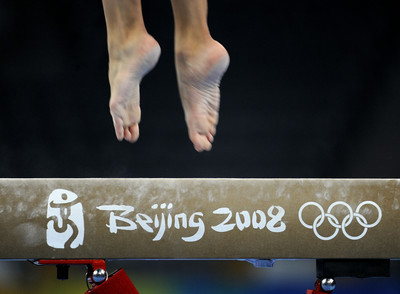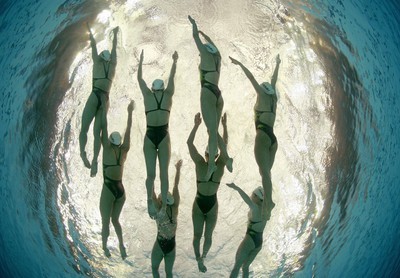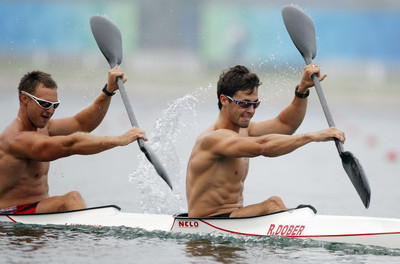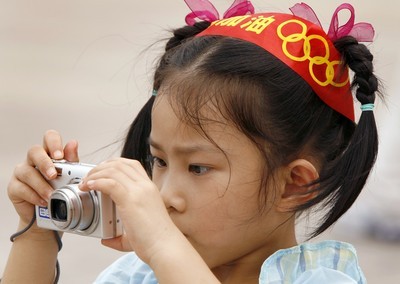CHANGING CHINA
BEIJING — It can't be the way Peter Ueberroth wants. It can't be all nice and neat and arrive wrapped in a bow. It has to resemble an imperfect portrait, with all sorts of different colors and angles and moods that identify the work. Some of it beautiful. Some not.
If we are going to witness how a global power defined by communist rule holds up under the intense scrutiny of a universal stare, failures must be as discernible as triumphs. It's like adolescence. You can't completely avoid the pimples.
China opens its doors to the world tonight with the hope that billions of dollars spent on impeccable preparation and pristine facilities is enough to focus all attention on sport and not its soiled image on subjects such as human rights, genocide in Darfur and the occupation of Tibet. It's a goal taller than any of the skyscrapers that blanket the streets of this northeastern city.
China's hope for the 2008 Olympic Games is that, when the flame is extinguished at closing ceremonies on Aug. 24, a nation of 1.3 billion people will have been welcomed by the international community like never before -- as more partners than pariahs in a different kind of march. One that encourages peace and tolerance.
"We are not anybody's State Department," said Ueberroth, the United States Olympic Committee chairman. "We're not trying to change the world. The Olympics bring hope to the world. Nothing else can bring people together like this. The Olympic Games opens countries up. It does not close countries. China is an enormous figure on the world scene now, and for any issue out there, this country will be better for having the Olympics."
There is no way of knowing that, no certainty that should China stage what many already are predicting will be the most successful Olympics in history, before one hurdle is scaled or basket made, the doors will close and the warts so brilliantly concealed by new structures will again emerge like the sun does through layers of polluted sky every third week here.
To watch Ueberroth and his fellow USOC suits on Wednesday was to watch the Tea Cup ride at Disneyland. They spun so much positive praise on China, it's no wonder all didn't depart the dais suffering from queasy stomachs and dizziness.
This part was justified: China in 1984 saved the Olympics at a time when the movement was about as popular as Terrell Owens outside Texas. The Soviets decided to boycott (translation: they gave heavy payback for a similar act by the U.S. in Moscow four years earlier) and insisted the move would keep 100 countries from competing in the States. But then China agreed to rejoin the Olympics, and Romania and the former Yugoslavia and others followed. Disaster was averted, all because of the nation carrying a red flag with yellow stars.
"China deserves to be recognized for that," Ueberroth said. "We'll never forget. It changed our Games; 90,000 people stood and cheered and welcomed China. Nobody asked them to. I stand in awe coming here now and seeing what they have done since 1984. Everything is as good as I have ever seen it."
Marvel at the facilities but don't forget the poor air quality. Be amazed at the hundreds of thousands of volunteers, and yet wonder if behind those smiles exists mere acceptance of living within a totalitarian state.
Watch opening ceremonies performance tonight, promised to reach beyond spectacular in form and flamboyance, only to realize away from the fireworks and dancing dragons still remain somber facts about humans rights' violations.
China today is different in so many ways from 20 years ago. Teenagers dress in stylish jeans while listening to iPods and sipping lattes from Starbucks. They can't soak up enough Western influence. People own homes and cars. Hundreds of millions have left poverty behind.
But such progress won't stop politics from hovering over these Olympics much as they did Berlin 72 years ago. Back then, Adolph Hitler used the Games for propaganda. China is using them to sell a new image of modernization, captured so extraordinarily here by towering buildings and contemporary airport and rail systems.
From the outside, China today resembles Mao Zedong's reign as much as Las Vegas does Alaska.
Decide for yourself over the next 17 days how much the Olympics might change the world's perception of China, but not without considering all the good and bad. It's the only sensible approach. It can't be the way Ueberroth wants. This isn't some ride at Disneyland.
This is still a government that promised to show an accepting, reasonable side these Games, and it already this week denied visas to two American athletes and Darfur activists, Winter Games speed skater Joey Cheek and decathlete Chris Boyles, who did not qualify for Beijing. This is still an Olympics that should best be viewed as an imperfect portrait.
"For so long, China was isolated from the outside world, completely cut off and alienated and excluded," said Guo-ou Zhuang, assistant professor in the Foreign Language Department at UNLV who was born and raised in China. "But very few people disagree in China about the opportunity this presents the country. It's about national pride for them.
"I truly believe the Chinese government has relaxed in a way that if you don't change with the times and improve the lives of your people, you can't keep moving forward as a society. They have been waiting for something like hosting the Olympics for 100 years. They have great confidence in themselves and this opportunity to shine on a world stage."
The doors are open. There is nowhere for China to hide. One world, one dream, countless story lines both inspiring and controversial.
Have a good long look, but do so with eyes wide open.
Ed Graney will file daily columns from the Olympic Games. He also will post daily blogs at www.reviewjournal.com. He can be reached at 702-383-4618 or egraney@reviewjournal.com.

























